2017高考英语专题复习课件情态动词
图片预览
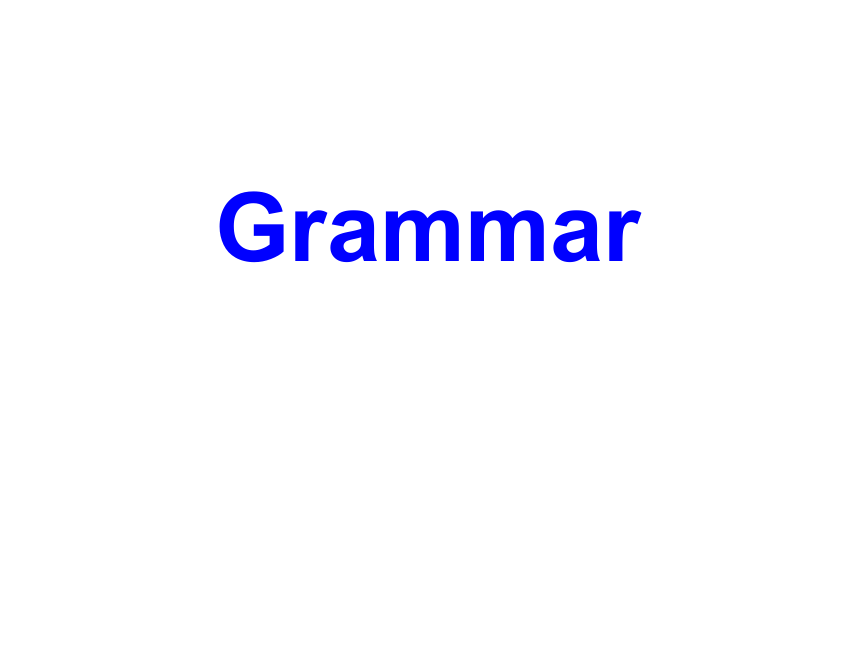


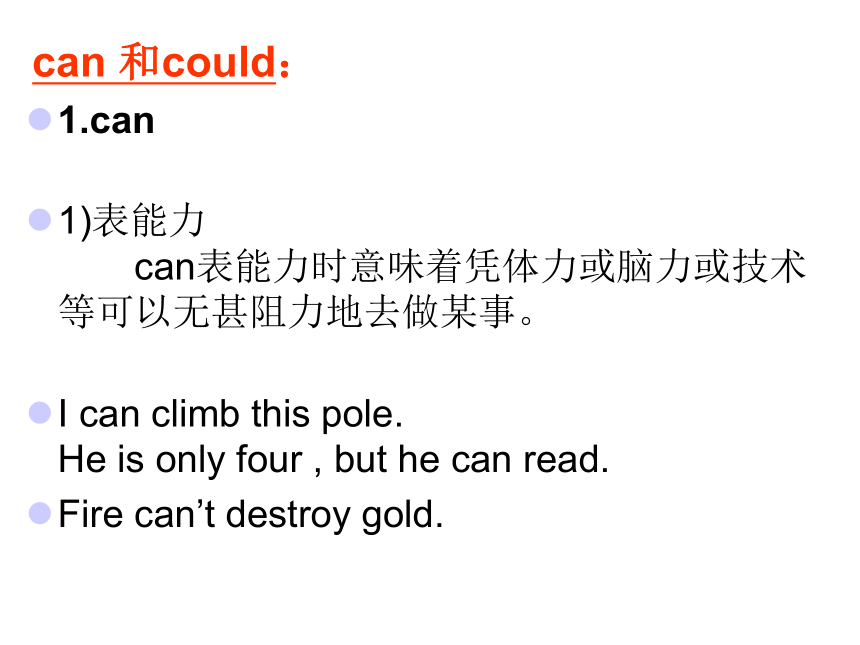
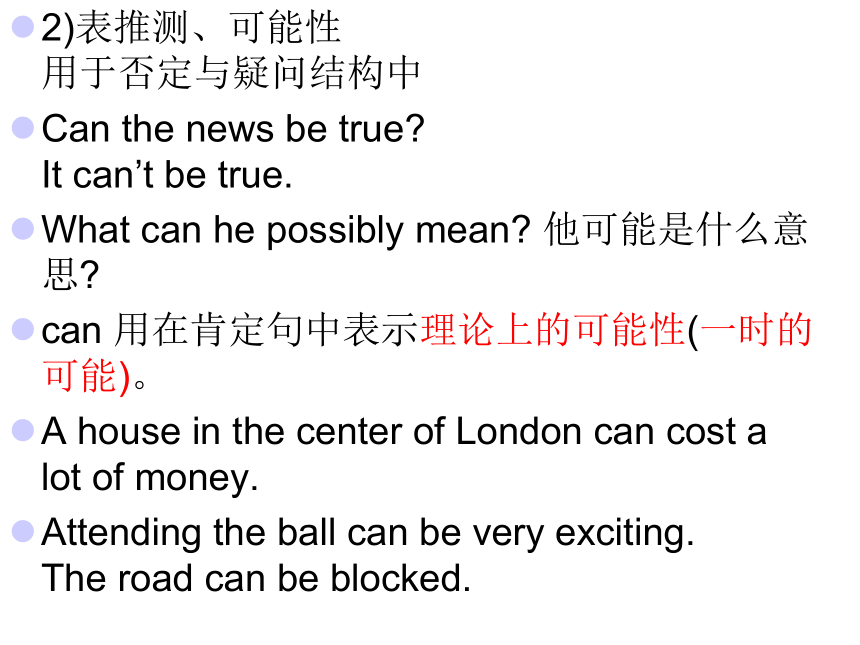


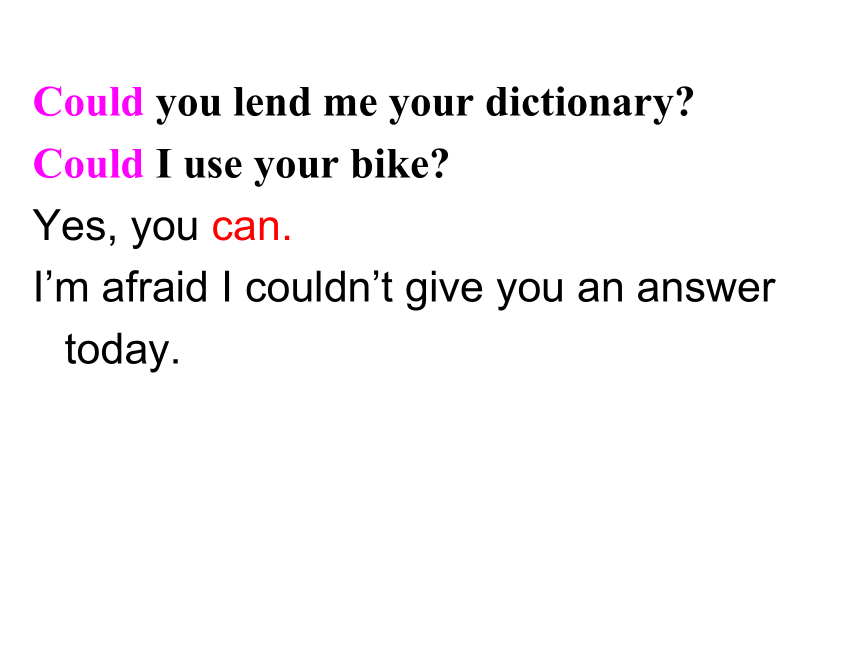
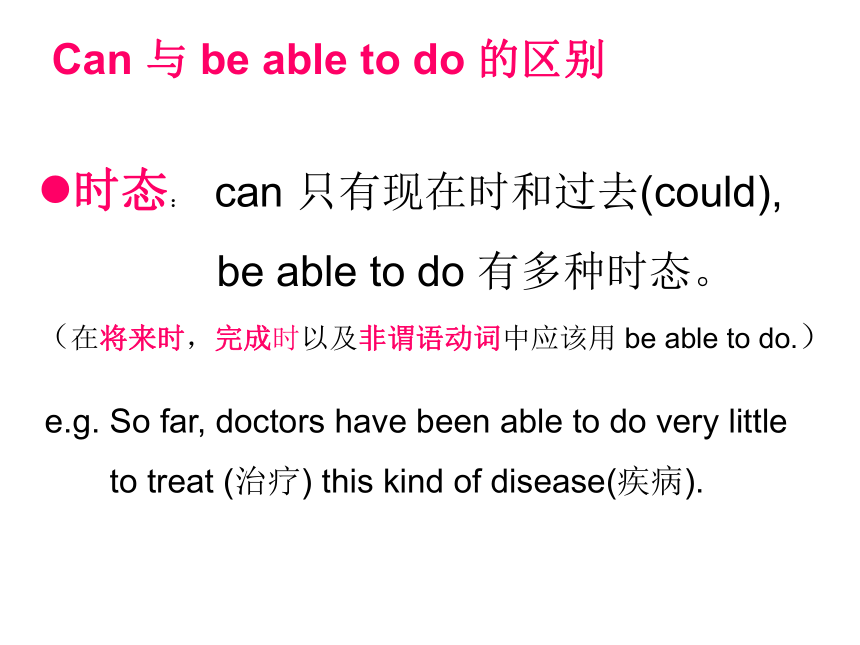
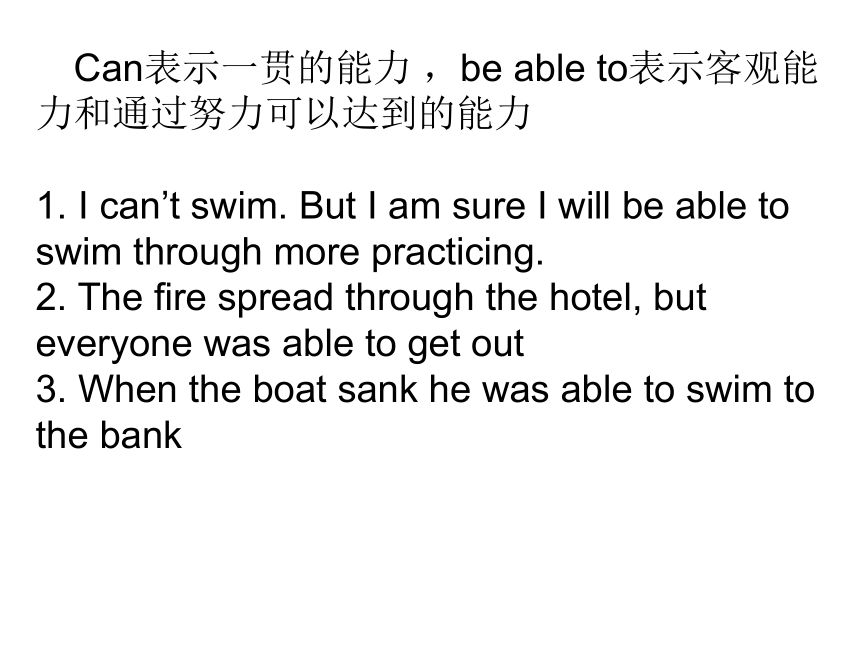
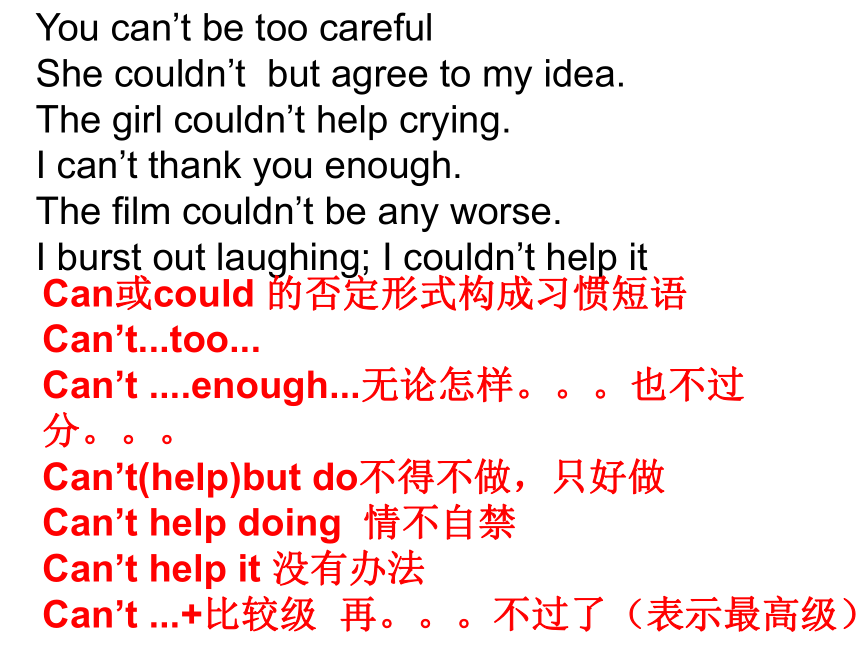
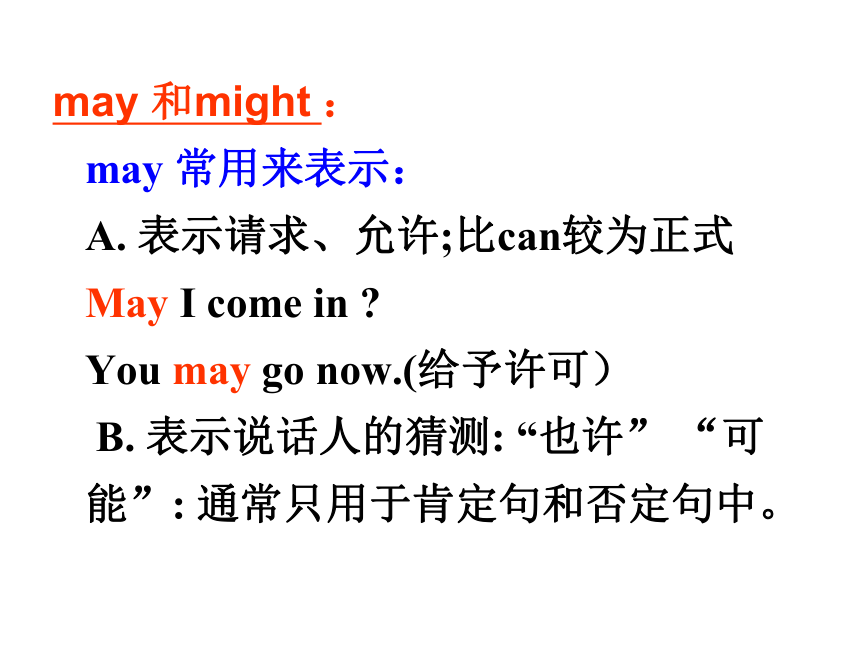
文档简介
课件51张PPT。Grammar情态动词用法情态动词的语法特征1)?情态动词?不能单独做谓语,除ought ?和have?外,后面只能接不带to?的不定式。 2)?情态动词没有人称,数的变化,但有些情态动词,如can、will也有一般式和过去式的变化。3)?情态动词的“时态”形式并不是时间区别的主要标志,不少情况下,情态动词的现在式形式和过去式形式都可用来表示现在时间、过去时间和将来时间。1.can
1)表能力 can表能力时意味着凭体力或脑力或技术等可以无甚阻力地去做某事。
I can climb this pole. He is only four , but he can read.
Fire can’t destroy gold. can 和could:2)表推测、可能性 用于否定与疑问结构中
Can the news be true? It can’t be true.
What can he possibly mean? 他可能是什么意思?
can 用在肯定句中表示理论上的可能性(一时的可能)。
A house in the center of London can cost a lot of money.
Attending the ball can be very exciting. The road can be blocked. 3)表示请求或允许(和may意思相近)常见于口语。
Can (May) I come in ? 我能进来吗?
Can I smoke here ? 我可以在这里抽烟吗? 2) could的主要用法是:
A. could 是can的过去式, 表示与过去 有关的能力和推测:
eg. We all knew that the young man
couldn’t be a doctor.
B. could可以代替can表示请求、“允许”。可表示委婉客气的提出问题或陈述看法Could you lend me your dictionary?
Could I use your bike?
Yes, you can.
I’m afraid I couldn’t give you an answer today. Can 与 be able to do 的区别时态: can 只有现在时和过去(could),
be able to do 有多种时态。
(在将来时,完成时以及非谓语动词中应该用 be able to do.)e.g. So far, doctors have been able to do very little
to treat (治疗) this kind of disease(疾病). Can表示一贯的能力 ,be able to表示客观能力和通过努力可以达到的能力
1. I can’t swim. But I am sure I will be able to swim through more practicing. 2. The fire spread through the hotel, but everyone was able to get out 3. When the boat sank he was able to swim to the bank You can’t be too careful
She couldn’t but agree to my idea.
The girl couldn’t help crying.
I can’t thank you enough.
The film couldn’t be any worse.
I burst out laughing; I couldn’t help itCan或could 的否定形式构成习惯短语
Can’t...too...
Can’t ....enough...无论怎样。。。也不过分。。。
Can’t(help)but do不得不做,只好做
Can’t help doing 情不自禁
Can’t help it 没有办法
Can’t ...+比较级 再。。。不过了(表示最高级)may 和might :
may 常用来表示:
?A. 表示请求、允许;比can较为正式 May I come in ?
You may go now.(给予许可)
B. 表示说话人的猜测: “也许” “可能”: 通常只用于肯定句和否定句中。 eg. --I believe the man is from England.
--But I may be wrong.
The guest may arrive this afternoon.
在疑问句中,表示可能性用can。
如:Where can he be? 他会在哪呢? C. 表示祝愿;但语气较正式:
eg. May you succeed!
May you have a good journey!
might 的用法有:
多在间接引语中表示过去的可能和允许。如:
She said that he might take her bike.
她说他可以拿她的自行车去用
表示现在的许可, 语气比may 较委婉, 一般用于疑问句(包括间接疑问句), 不可用于肯定句或者否定句。
如: Might I have a word with you?
我可以和你说句话吗?You may well be right
There is nothing to do, so I may as well go to bed.
The film is so boring, and we might as well not have come to see it.
May well 很可能、有充分的理由可以
May/might as well最好,不妨
Might as well have done 还不如
May ...do/be... 祝愿当回答由may 引起的问题时,否定答语要用must not,表示“不许可”、“不应该”、“不行”。 May I come in? Yes, you may. No,you can’t No, you may not . No ,you mustn’t No ,you’d better not. will和would: 1. will是助动词或是情态动词?
will用于构成将来时是助动词。用于表示“意志”“决心”“请求”是情态动词。would亦同理。
eg. I will tell you something
important.
我要告诉你一些重要的事。
(助动词)? Will you tell her that I'm here?
请您告诉她说我在这儿,好吗?
(情态动词) ?
If you give him time,Tom will talk and talk for hours.
Every Saturday evening they will play chess together
The door won’t open
I’ll do my best to help you.
Will you please give me a message when you see him?
---Write to me when you get home.
---I will经常性习惯性“老是、总是、终归是表示功能,译作“能”或“行”意愿2人称,询问对方意愿或向对方提出请求回答祈使句Would表示有礼貌的请求或邀请(2人称)
Would you help us, please?
请您帮助我们,好吗?
When I had some trouble, he would encourage me.
We all tried to atop him smoking in bed but he wouldn’t listen.过去的习惯意愿“要;愿”Would 与 Used to do 区别 ——— “过去常常” Would
------过去习惯的动作(现在有可能还有此习惯)
Used to do
--------过去习惯的动作及状态(现在已经没有此习惯)e.g. He would get up at 8 a.m.
(现在有可能还在坚持此习惯)
e.g. He used to get up at 8 a.m.
(现在已经不再坚持此习惯)动作e.g. There used to be an old building
here when I was young.状态shall和should: 1. shall用于构成将来时是助动词。
shall用于征求对方的意见,表示 “决心” 是情态动词。
eg: Perhaps I shall pay a visit to
England this winter.
可能今年冬天我会去英国观光。
(构成一般将来时, 助动词) Shall we go by train, Mom?
妈妈,我们乘火车去好吗?
(用于征求对方的意见,情态动词)
I shall go at once.
我必须立即去。
(表 “决心”,情态动词)
1)用于第一、 三人称征求对方的意见,
What shall I wear on the journey?
Shall we dance?
2)shall 用于第二、三人称时表允诺,警告,命令,威胁。“必须,应该可以”
If he passes the examination, he shall have a holiday.
You shall have it back tomorrow.3)用于第二、三人称用于法律法规条例等文件中的要求。“应该、必须”
It’s required in our regulation that students shall go to school on time.
Persons under 18 shan’t be employed in night work.
2. should表示义务、建议、劝告等,意为 “应该”。(ought to)
Students should respect teachers.
The boys shouldn’t be playing football; they should be at school.
It’s 4:30,They should be in New York by now.
He ought to succeed, as he is so diligent.
It is strange that it should be so hot today.
I don’t understand why she should have made such a mistake.
Should it rain tomorrow, the meeting will be postponed.劝告、建议义务、责任常规、常理的推测(正常情况下)按理应该居然,竟然与疑问词连用,表示意外、纳闷、惊讶等“究竟是,到底”用于条件句中“万一”must和 have?to1.must用于一般问句中,肯定回答用must否定式用?needn’t或don’t have to,做?“不必”,mustn’t表示“禁止,不允许” ?— Must?I?finish?all?assignments?at?a?time? ??—Yes, you must.
No,?you?needn't. I don’t like this TV set. We must buy a new one. There was no more bus. They had to walk home.2.表示“必须”这个意思时,must?和have?to?稍有区别。must着重说明主观看法,have?to?强调客观需要。另外,have?to?能用于更多时态。 ?You?must?be?the?new?teacher. ?
He?must?be?joking. There?is?nobody?here.?They?must?have?all gone?home. 3.must表示对某人某事的猜测,?作“准是”,“一定” ,一般用于肯定句中。对过去发生的事情作肯定判断用must have done He must come and worry her with question, just when she was busy cooking the dinner. Of course,after I gave her my advice,she must go and do the opposite.
—How old are you, madam?
—If you must know, I'm twice my son's age.
4. must表示“偏要,硬要”,指做令人不快的事情need 与 dare 实义动词情态动词实义动词 vs 情态动词肯定句 实情e.g. She needs to stay at home today.
e.g. He dares to jump from the high wall.
e.g. She need stay at home today.
e.g. He dare jump from the high wall.疑问句
e.g. Does she need to stay at home today?
e.g. Does he dare to jump from the high wall?e.g. Need she stay at home today?
e.g. Dare he jump from the high wall?实情否定句Dare 作为实意动词的时候,否定句中的 to 可以省略e.g.He doesn’t dare (to) jump from the high wall.实e.g. She doesn’t need to stay at home today.
e.g. He doesn’t dare to jump from the high wall情e.g. She needn’t stay at home today.
e.g. He dare not jump from the high wall.1. It must have rained last night,for the streets are wet.
2. It is 8 o’clock.they may have arrived
3. He looks very happy. He might not have known the result
4. He could not have done such a thing.
5. She didn’t come to school yesterday. Can she have been ill?
6. They left here early and should have arrived by now情态动词表推测 对过去情况的推测7. you might have written the letter without my reminding you of it.
8. The doctor could have avoided the accident
9. you should have finished the task yesterday.
10I was really anxious about you.you shouldn’t have left home without a word
11.He ought not to have told me your secret,but he meant no harm过去本可能(不用may) 过去本能够…却没有过去本应该…却没有过去本不该…过去本不该…It was not cold yesterday. I needn’t have taken the thick sweaters out
It was not cold yesterday. I didn’t need to take the thick sweaters out过去本不必…,却做了.过去不必做,实际也没有做表推测的情态动词句子的反意疑问句 He must/may be in the room, isn’t he? He can’t be in the room, is he? He must have finished the work, hasn’t he? He may have done the work last night, didn’t he? He must have been caught in the heavy rain last night,____________
wasn’t he ----____ I go out to play, mum?
----No, you___. You should do your
homework first.
A. Might; wouldn’t
B. May; had better not
C. Must; mustn’t
D. Need; mustn’tBPractice 2. ---Where is Emma?
---I can’t say for sure where she is,
but she___ be out shopping.
A. can
B. should
C. must
D. mayD3. The room is in a terrible mess; it
____ cleaned.
A. can’t have been
B. couldn’t be
C. may have been
D. would be
A4. How ____ you say that you really
understand the whole story if you
have covered only part of the article?
A. can
B. must
C. need
D. mayA5. There ____ be any difficulty about
passing the road test since you have
practised a lot in the driving school.
A. mustn’t
B. shan’t
C. shouldn’t
D. needn’t
C6.---There were already five people in the car but they managed to take me as well.
---It ____a comfortable journey. ( )
A. can't be B. mustn't have been
C. shouldn't be D. couldn't have beenD7.The fire spread through the hotel very quickly but everyone ___ get out. ( )
A. had to B. would
C. could D. was able toD8. Peter ___ come with us tonight, but he isn’t very sure.
must B. can C. may D. willC9. --- Could I call you by your first name? --- Yes, you____.
A. will B. could C. may D. mightC10. Sorry, I ’m late. I ___ have turned off the alarm clock and gone back to sleep again.
might B. should C. can D. willA11.--Excuse me, but I want to use your computer to type a report.
--You ____ have my computer if you don’t take care of it.
shan’t B. might not
C. needn’t D. shouldn’tA12. ---When can I come for the photos ? I need them tomorrow afternoon.
---They _____be ready by 12 : 00 .
A. can B. should C. might D. needB13. With so much work on hand, you ____to see the game last night.
A. mustn’t go B. could have gone
C. shouldn’t go D. shouldn’t have goneD14.Johnny, you ______play with the knife, you ____hurt yourself.
A. won't ; can't B. mustn't ; may
C. shouldn't ; must D. can't ; wouldn'tB15.There is no light in the dormitory. They must have gone to the lecture, _____?
A. didn’t they B. don’t they
C. mustn’t they D. haven’t theyD16. I missed the bus, so I ___ go home on foot.
A. must B. may C. can D. had toD
1)表能力 can表能力时意味着凭体力或脑力或技术等可以无甚阻力地去做某事。
I can climb this pole. He is only four , but he can read.
Fire can’t destroy gold. can 和could:2)表推测、可能性 用于否定与疑问结构中
Can the news be true? It can’t be true.
What can he possibly mean? 他可能是什么意思?
can 用在肯定句中表示理论上的可能性(一时的可能)。
A house in the center of London can cost a lot of money.
Attending the ball can be very exciting. The road can be blocked. 3)表示请求或允许(和may意思相近)常见于口语。
Can (May) I come in ? 我能进来吗?
Can I smoke here ? 我可以在这里抽烟吗? 2) could的主要用法是:
A. could 是can的过去式, 表示与过去 有关的能力和推测:
eg. We all knew that the young man
couldn’t be a doctor.
B. could可以代替can表示请求、“允许”。可表示委婉客气的提出问题或陈述看法Could you lend me your dictionary?
Could I use your bike?
Yes, you can.
I’m afraid I couldn’t give you an answer today. Can 与 be able to do 的区别时态: can 只有现在时和过去(could),
be able to do 有多种时态。
(在将来时,完成时以及非谓语动词中应该用 be able to do.)e.g. So far, doctors have been able to do very little
to treat (治疗) this kind of disease(疾病). Can表示一贯的能力 ,be able to表示客观能力和通过努力可以达到的能力
1. I can’t swim. But I am sure I will be able to swim through more practicing. 2. The fire spread through the hotel, but everyone was able to get out 3. When the boat sank he was able to swim to the bank You can’t be too careful
She couldn’t but agree to my idea.
The girl couldn’t help crying.
I can’t thank you enough.
The film couldn’t be any worse.
I burst out laughing; I couldn’t help itCan或could 的否定形式构成习惯短语
Can’t...too...
Can’t ....enough...无论怎样。。。也不过分。。。
Can’t(help)but do不得不做,只好做
Can’t help doing 情不自禁
Can’t help it 没有办法
Can’t ...+比较级 再。。。不过了(表示最高级)may 和might :
may 常用来表示:
?A. 表示请求、允许;比can较为正式 May I come in ?
You may go now.(给予许可)
B. 表示说话人的猜测: “也许” “可能”: 通常只用于肯定句和否定句中。 eg. --I believe the man is from England.
--But I may be wrong.
The guest may arrive this afternoon.
在疑问句中,表示可能性用can。
如:Where can he be? 他会在哪呢? C. 表示祝愿;但语气较正式:
eg. May you succeed!
May you have a good journey!
might 的用法有:
多在间接引语中表示过去的可能和允许。如:
She said that he might take her bike.
她说他可以拿她的自行车去用
表示现在的许可, 语气比may 较委婉, 一般用于疑问句(包括间接疑问句), 不可用于肯定句或者否定句。
如: Might I have a word with you?
我可以和你说句话吗?You may well be right
There is nothing to do, so I may as well go to bed.
The film is so boring, and we might as well not have come to see it.
May well 很可能、有充分的理由可以
May/might as well最好,不妨
Might as well have done 还不如
May ...do/be... 祝愿当回答由may 引起的问题时,否定答语要用must not,表示“不许可”、“不应该”、“不行”。 May I come in? Yes, you may. No,you can’t No, you may not . No ,you mustn’t No ,you’d better not. will和would: 1. will是助动词或是情态动词?
will用于构成将来时是助动词。用于表示“意志”“决心”“请求”是情态动词。would亦同理。
eg. I will tell you something
important.
我要告诉你一些重要的事。
(助动词)? Will you tell her that I'm here?
请您告诉她说我在这儿,好吗?
(情态动词) ?
If you give him time,Tom will talk and talk for hours.
Every Saturday evening they will play chess together
The door won’t open
I’ll do my best to help you.
Will you please give me a message when you see him?
---Write to me when you get home.
---I will经常性习惯性“老是、总是、终归是表示功能,译作“能”或“行”意愿2人称,询问对方意愿或向对方提出请求回答祈使句Would表示有礼貌的请求或邀请(2人称)
Would you help us, please?
请您帮助我们,好吗?
When I had some trouble, he would encourage me.
We all tried to atop him smoking in bed but he wouldn’t listen.过去的习惯意愿“要;愿”Would 与 Used to do 区别 ——— “过去常常” Would
------过去习惯的动作(现在有可能还有此习惯)
Used to do
--------过去习惯的动作及状态(现在已经没有此习惯)e.g. He would get up at 8 a.m.
(现在有可能还在坚持此习惯)
e.g. He used to get up at 8 a.m.
(现在已经不再坚持此习惯)动作e.g. There used to be an old building
here when I was young.状态shall和should: 1. shall用于构成将来时是助动词。
shall用于征求对方的意见,表示 “决心” 是情态动词。
eg: Perhaps I shall pay a visit to
England this winter.
可能今年冬天我会去英国观光。
(构成一般将来时, 助动词) Shall we go by train, Mom?
妈妈,我们乘火车去好吗?
(用于征求对方的意见,情态动词)
I shall go at once.
我必须立即去。
(表 “决心”,情态动词)
1)用于第一、 三人称征求对方的意见,
What shall I wear on the journey?
Shall we dance?
2)shall 用于第二、三人称时表允诺,警告,命令,威胁。“必须,应该可以”
If he passes the examination, he shall have a holiday.
You shall have it back tomorrow.3)用于第二、三人称用于法律法规条例等文件中的要求。“应该、必须”
It’s required in our regulation that students shall go to school on time.
Persons under 18 shan’t be employed in night work.
2. should表示义务、建议、劝告等,意为 “应该”。(ought to)
Students should respect teachers.
The boys shouldn’t be playing football; they should be at school.
It’s 4:30,They should be in New York by now.
He ought to succeed, as he is so diligent.
It is strange that it should be so hot today.
I don’t understand why she should have made such a mistake.
Should it rain tomorrow, the meeting will be postponed.劝告、建议义务、责任常规、常理的推测(正常情况下)按理应该居然,竟然与疑问词连用,表示意外、纳闷、惊讶等“究竟是,到底”用于条件句中“万一”must和 have?to1.must用于一般问句中,肯定回答用must否定式用?needn’t或don’t have to,做?“不必”,mustn’t表示“禁止,不允许” ?— Must?I?finish?all?assignments?at?a?time? ??—Yes, you must.
No,?you?needn't. I don’t like this TV set. We must buy a new one. There was no more bus. They had to walk home.2.表示“必须”这个意思时,must?和have?to?稍有区别。must着重说明主观看法,have?to?强调客观需要。另外,have?to?能用于更多时态。 ?You?must?be?the?new?teacher. ?
He?must?be?joking. There?is?nobody?here.?They?must?have?all gone?home. 3.must表示对某人某事的猜测,?作“准是”,“一定” ,一般用于肯定句中。对过去发生的事情作肯定判断用must have done He must come and worry her with question, just when she was busy cooking the dinner. Of course,after I gave her my advice,she must go and do the opposite.
—How old are you, madam?
—If you must know, I'm twice my son's age.
4. must表示“偏要,硬要”,指做令人不快的事情need 与 dare 实义动词情态动词实义动词 vs 情态动词肯定句 实情e.g. She needs to stay at home today.
e.g. He dares to jump from the high wall.
e.g. She need stay at home today.
e.g. He dare jump from the high wall.疑问句
e.g. Does she need to stay at home today?
e.g. Does he dare to jump from the high wall?e.g. Need she stay at home today?
e.g. Dare he jump from the high wall?实情否定句Dare 作为实意动词的时候,否定句中的 to 可以省略e.g.He doesn’t dare (to) jump from the high wall.实e.g. She doesn’t need to stay at home today.
e.g. He doesn’t dare to jump from the high wall情e.g. She needn’t stay at home today.
e.g. He dare not jump from the high wall.1. It must have rained last night,for the streets are wet.
2. It is 8 o’clock.they may have arrived
3. He looks very happy. He might not have known the result
4. He could not have done such a thing.
5. She didn’t come to school yesterday. Can she have been ill?
6. They left here early and should have arrived by now情态动词表推测 对过去情况的推测7. you might have written the letter without my reminding you of it.
8. The doctor could have avoided the accident
9. you should have finished the task yesterday.
10I was really anxious about you.you shouldn’t have left home without a word
11.He ought not to have told me your secret,but he meant no harm过去本可能(不用may) 过去本能够…却没有过去本应该…却没有过去本不该…过去本不该…It was not cold yesterday. I needn’t have taken the thick sweaters out
It was not cold yesterday. I didn’t need to take the thick sweaters out过去本不必…,却做了.过去不必做,实际也没有做表推测的情态动词句子的反意疑问句 He must/may be in the room, isn’t he? He can’t be in the room, is he? He must have finished the work, hasn’t he? He may have done the work last night, didn’t he? He must have been caught in the heavy rain last night,____________
wasn’t he ----____ I go out to play, mum?
----No, you___. You should do your
homework first.
A. Might; wouldn’t
B. May; had better not
C. Must; mustn’t
D. Need; mustn’tBPractice 2. ---Where is Emma?
---I can’t say for sure where she is,
but she___ be out shopping.
A. can
B. should
C. must
D. mayD3. The room is in a terrible mess; it
____ cleaned.
A. can’t have been
B. couldn’t be
C. may have been
D. would be
A4. How ____ you say that you really
understand the whole story if you
have covered only part of the article?
A. can
B. must
C. need
D. mayA5. There ____ be any difficulty about
passing the road test since you have
practised a lot in the driving school.
A. mustn’t
B. shan’t
C. shouldn’t
D. needn’t
C6.---There were already five people in the car but they managed to take me as well.
---It ____a comfortable journey. ( )
A. can't be B. mustn't have been
C. shouldn't be D. couldn't have beenD7.The fire spread through the hotel very quickly but everyone ___ get out. ( )
A. had to B. would
C. could D. was able toD8. Peter ___ come with us tonight, but he isn’t very sure.
must B. can C. may D. willC9. --- Could I call you by your first name? --- Yes, you____.
A. will B. could C. may D. mightC10. Sorry, I ’m late. I ___ have turned off the alarm clock and gone back to sleep again.
might B. should C. can D. willA11.--Excuse me, but I want to use your computer to type a report.
--You ____ have my computer if you don’t take care of it.
shan’t B. might not
C. needn’t D. shouldn’tA12. ---When can I come for the photos ? I need them tomorrow afternoon.
---They _____be ready by 12 : 00 .
A. can B. should C. might D. needB13. With so much work on hand, you ____to see the game last night.
A. mustn’t go B. could have gone
C. shouldn’t go D. shouldn’t have goneD14.Johnny, you ______play with the knife, you ____hurt yourself.
A. won't ; can't B. mustn't ; may
C. shouldn't ; must D. can't ; wouldn'tB15.There is no light in the dormitory. They must have gone to the lecture, _____?
A. didn’t they B. don’t they
C. mustn’t they D. haven’t theyD16. I missed the bus, so I ___ go home on foot.
A. must B. may C. can D. had toD
